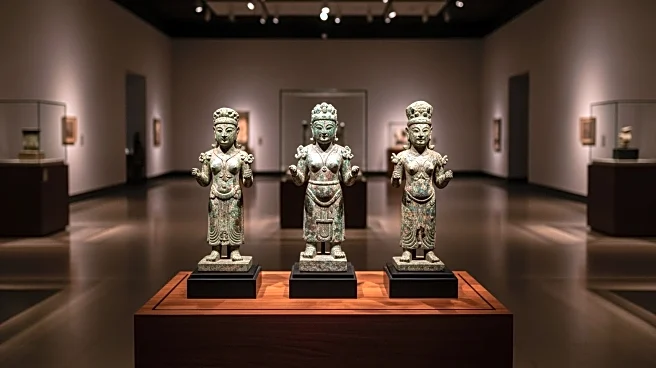What's Happening?
As the 2026 midterm elections approach, political dynamics in Washington are increasingly influenced by electoral calculations and party strategies. Despite this, a few members of Congress continue to stand out for their independent stances. Notable figures include U.S. Senator Rand Paul and U.S. Representative Thomas Massie from Kentucky, who have consistently prioritized transparency and restraint over party comfort. Massie's recent collaboration with Democrat Ro Khanna on the Epstein Files Transparency Act exemplifies bipartisan efforts to promote accountability. Similarly, U.S. Representative Don Bacon from Nebraska has maintained a centrist approach, challenging party pressures and advocating for policy changes. These individuals represent a diminishing group of lawmakers who prioritize principles over party allegiance, often facing political repercussions for their actions.
Why It's Important?
The presence of independent voices in Congress is crucial for maintaining a balance in legislative processes. These political mavericks often act as a check against extreme partisan measures, ensuring that policies are debated substantively rather than dictated by party lines. Their willingness to challenge party leadership can lead to more nuanced and effective policy outcomes. However, their independence also makes them targets for political retribution, particularly from figures like President Trump, who has openly sought to penalize dissent within his party. As the political landscape becomes increasingly polarized, the role of these mavericks becomes more significant in fostering dialogue and compromise, which are essential for democratic governance.
What's Next?
With the midterm elections on the horizon, the actions of these independent lawmakers could influence voter perceptions and party strategies. Their ability to sway public opinion and legislative outcomes may depend on their continued commitment to their principles amidst growing partisan pressures. The political environment may see increased efforts to marginalize or co-opt these mavericks, potentially impacting their future roles in Congress. Observers will be watching to see if their influence can lead to broader shifts in party dynamics or inspire more lawmakers to adopt independent stances.
Beyond the Headlines
The actions of political mavericks highlight broader ethical and cultural questions about the role of individual conscience in politics. Their willingness to stand alone raises important discussions about the nature of leadership and the impact of factionalism on policy-making. As party ideologies increasingly dominate political discourse, the need for independent thought and action becomes more apparent. This trend may encourage a reevaluation of political values and the importance of diversity in political representation.








